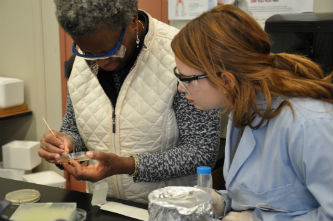Lehigh awarded Howard Hughes Medical Institute grant to improve science education for undergraduates
Lehigh University is the recipient of a five-year, $1.9 million grant from the Howard Hughes Medical Institute (HHMI) to enhance undergraduate science education.
The program will be directed by Biological Sciences faculty Neal Simon and Vassie Ware, who also led Lehigh’s 2006 and 2010 HHMI awards. From a pool of 170 applications from major research universities nationwide, Lehigh was one of only 37 to be awarded a grant to chart new ways to retain students who enter STEM (science, technology, engineering, or mathematics) education.
The Lehigh team will use the funds to improve retention in bioscience-related fields among at-risk and underrepresented students, as well as the full population of students studying a STEM field.
Lehigh’s programmatic focus is to integrate extensive research engagement early in the learning process with innovative advising and mentoring support services from around the university. Ware and Simon developed the new program based on their previous and current HHMI-supported initiatives that significantly impacted student approaches to the complex issues facing the life sciences. Hallmarks have included expanded inquiry-based experiences through new interdisciplinary courses, the SEA-PHAGES program, and interdisciplinary team research through the Biosystems Dynamics Summer Institute.
With the new award, Lehigh will expand research experiences and bring intensive mentorship and advising to the first and second years of STEM education. Simon said that “the primary focus will be on improving persistence and retention in STEM among members of disadvantaged and underrepresented groups, which will meet a national need and broaden Lehigh’s efforts in diversity.”
The Lehigh team’s two-pronged approach echoes what many in higher education are calling an important partnership for the future of higher education: research universities and community colleges. One prong will be Bioconnect: Community College Collaborations to Improve Stem Retention. The Lehigh team will leverage existing partnerships with community colleges to increase the number of students who successfully transfer from a community college to the universities where most of the nation’s scientists are produced. Ware noted that “by providing Lehigh-sponsored, bioscience-related interdisciplinary research experiences, strong mentoring, and interactions as part of an established community of STEM students at Lehigh, community college transfer students will find themselves better prepared for graduation and more in tune with an interdisciplinary research culture that is a defining feature of Lehigh’s approach to life science education.”
Coupled with BioConnect is RARE, The Rapidly Accelerated Research Experience. This pre-admission-to-graduation science immersion program incorporates four dimensions that are essential for success among students that are underrepresented in STEM fields: an innovative curriculum, a strong sense of identity as part of a community of scholars, the addressing of cultural issues that contribute to low success rates, and an understanding of the commitment required to excel in STEM. RARE will test whether a comprehensive 4-year approach can improve retention in STEM among at-risk and underrepresented students.
“To keep these science-minded students, we must deliver engaging and effective science experiences and a strong supportive environment, particularly in the first two years of college,” said Simon.
The 2014 HHMI Competition
In 2013, HHMI issued a challenge to research universities like Lehigh seeking strategies that would lead to more students sticking with science as an undergraduate major, with special attention to historically underrepresented populations. The challenge was to improve how science is taught, explore ways to provide early opportunities for students to engage in research aside from “standard laboratory courses,” and look for new ways to encourage all students, no matter what path brought them to science, to persist.
Of the three million students entering college each year, nearly 40 percent intend to study science and engineering, according to the Higher Education Research Institute of UCLA. Most do not make it through. In fact, more than half of all undergraduates who begin college intending to major in STEM fields do not complete a STEM degree. Minority applicants, who represent a growing portion of the nation’s talented students, are even less likely to persist in STEM and complete a degree.
In response to that challenge, 170 research universities submitted proposals to the HHMI.
The award to Lehigh falls under the HHMI’s “Student Learning and Faculty Development Communities” initiative. The funds will support the development of learning communities during the first and second year of STEM programs by improving interactions between and among students and faculty, especially among non-traditional, transfer, at-risk, and underrepresented students.
“The overarching goal will be to change the culture and climate,” said Ware, “so that students are engaged, made part of a larger scientific community, and ultimately find success in a STEM field.”
About HHMI
The Howard Hughes Medical Institute plays an influential role in advancing scientific research and education in the United States. Its scientists, located across the United States, have made important discoveries that advance our fundamental understanding of biology and its relation to human disease. In a complementary program at HHMI's Janelia Research Campus in Loudoun County, Virginia, leading scientists are pursuing long-term, high-risk, high-reward research in a campus designed to bring together researchers from disparate disciplines. The Institute also aims to transform science education into a creative, interdisciplinary endeavor that reflects the excitement of real research. For more information, visit www.hhmi.org. The Institute’s endowment at the close of fiscal 2013 was about $16.9 billion. HHMI’s headquarters are located in Chevy Chase, Maryland, just outside Washington, D.C.
###
Posted on:


